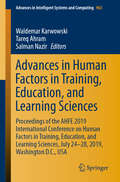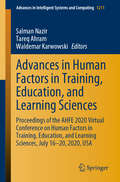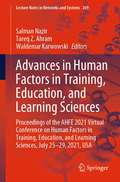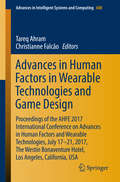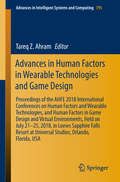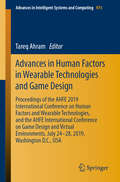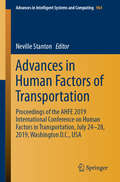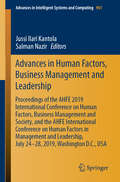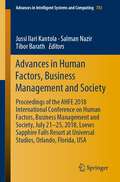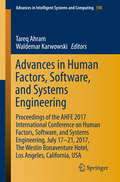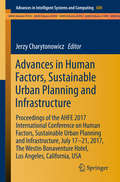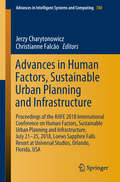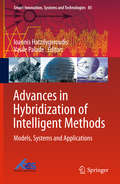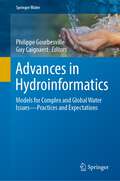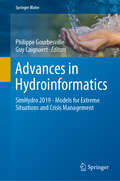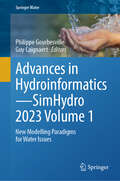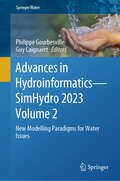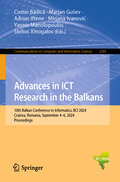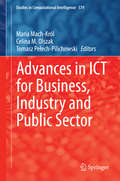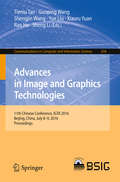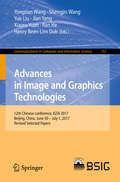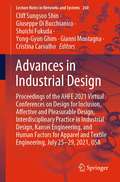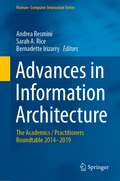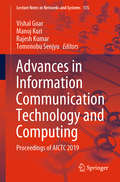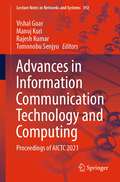- Table View
- List View
Advances in Human Factors in Training, Education, and Learning Sciences: Proceedings of the AHFE 2019 International Conference on Human Factors in Training, Education, and Learning Sciences, July 24-28, 2019, Washington D.C., USA (Advances in Intelligent Systems and Computing #963)
by Salman Nazir Waldemar Karwowski Tareq AhramThis book focuses on the importance of human factors in optimizing the learning and training process. It reports on the latest research and best practices and discusses key principles of behavioral and cognitive science, which are extremely relevant to the design of instructional content and new technologies to support mobile and multimedia learning, virtual training and web-based learning, among others, as well as performance measurements, social and adaptive learning and many other types of educational technologies, with a special emphasis on those important in the corporate, higher education, and military training contexts. Based on the AHFE 2019 Conference on Human Factors in Training, Education, and Learning Sciences, held on July 24-28, 2019, in Washington D.C., USA, the book offers a timely perspective on the role of human factors in education. It highlights important new ideas and will fosters new discussions on how to optimally design learning experiences.
Advances in Human Factors in Training, Education, and Learning Sciences: Proceedings of the AHFE 2020 Virtual Conference on Human Factors in Training, Education, and Learning Sciences, July 16-20, 2020, USA (Advances in Intelligent Systems and Computing #1211)
by Salman Nazir Waldemar Karwowski Tareq AhramThis book addresses the importance of human factors in optimizing the learning and training process. It reports on the latest research and best practices, and discusses key principles of behavioral and cognitive science, which are extremely relevant to the design of instructional content and new technologies to support mobile and multimedia learning, virtual training and web-based learning, among others, as well as performance measurements, social and adaptive learning and many other types of educational technology, with a special emphasis on those important in the corporate, higher education, healthcare and military training contexts. Gathering contributions to the AHFE 2020 Virtual Conference on Human Factors in Training, Education, and Learning Sciences, held on July 16–20, 2020, the book offers a timely perspective on the role of human factors in education. It highlights important new approaches and ideas, and fosters new discussions on how to optimally design learning experiences.
Advances in Human Factors in Training, Education, and Learning Sciences: Proceedings of the AHFE 2021 Virtual Conference on Human Factors in Training, Education, and Learning Sciences, July 25-29, 2021, USA (Lecture Notes in Networks and Systems #269)
by Salman Nazir Waldemar Karwowski Tareq Z. AhramThis book addresses the importance of human factors in optimizing the learning and training process. It reports on the latest research and best practices relating to the application of behavioral and cognitive science, and new technologies in the design of instructional and training content. It proposes innovative strategies for improving the learning and training experience and outcomes in different contexts, including lower and higher education, and different industry sectors. A special emphasis is given to digital and distance learning, gamification, and virtual training. Gathering contributions to the AHFE 2021 Conference on Human Factors in Training, Education, and Learning Sciences, held virtually on July 25-29, 2021, from USA, this book offers extensive information and a thought-provoking guide for both researchers and practitioners in the field of education and training.
Advances in Human Factors in Wearable Technologies and Game Design: Proceedings of the AHFE 2017 International Conference on Advances in Human Factors and Wearable Technologies, July 17-21, 2017, The Westin Bonaventure Hotel, Los Angeles, California, USA (Advances in Intelligent Systems and Computing #608)
by Tareq Ahram Christianne FalcãoThis book focuses on the human aspects of wearable technologies and game design, which are often neglected. It shows how user centered practices can optimize wearable experience, thus improving user acceptance, satisfaction and engagement towards novel wearable gadgets. It describes both research and best practices in the applications of human factors and ergonomics to sensors, wearable technologies and game design innovations, as well as results obtained upon integration of the wearability principles identified by various researchers for aesthetics, affordance, comfort, contextual-awareness, customization, ease of use, ergonomy, intuitiveness, obtrusiveness, information overload, privacy, reliability, responsiveness, satisfaction, subtlety, user friendliness and wearability. The book is based on the AHFE 2017 Conferences on Human Factors and Wearable Technologies and AHFE 2017 Conferences on Human Factors and Game Design, held on July 17-21, 2017, in Los Angeles, California, USA, and addresses professionals, researchers, and students dealing with the human aspects of wearable, smart and/or interactive technologies and game design research.
Advances in Human Factors in Wearable Technologies and Game Design: Proceedings of the AHFE 2018 International Conferences on Human Factors and Wearable Technologies, and Human Factors in Game Design and Virtual Environments, Held on July 21–25, 2018, in Loews Sapphire Falls Resort at Universal Studios, Orlando, Florida, USA (Advances in Intelligent Systems and Computing #795)
by Tareq Z. AhramThis book focuses on the human aspects of wearable technologies and game design, which are often neglected. It shows how user centered practices can optimize wearable experience, thus improving user acceptance, satisfaction and engagement towards novel wearable gadgets. It describes both research and best practices in the applications of human factors and ergonomics to sensors, wearable technologies and game design innovations, as well as results obtained upon integration of the wearability principles identified by various researchers for aesthetics, affordance, comfort, contextual-awareness, customization, ease of use, ergonomy, intuitiveness, obtrusiveness, information overload, privacy, reliability, responsiveness, satisfaction, subtlety, user friendliness and wearability. The book is based on the AHFE 2018 Conference on Human Factors and Wearable Technologies and the AHFE 2018 Conference on Human Factors in Game Design and Virtual Environments , held on July 21–25, 2018 in Orlando, Florida, and addresses professionals, researchers, and students dealing with the human aspects of wearable, smart and/or interactive technologies and game design research.
Advances in Human Factors in Wearable Technologies and Game Design: Proceedings of the AHFE 2019 International Conference on Human Factors and Wearable Technologies, and the AHFE International Conference on Game Design and Virtual Environments, July 24-28, 2019, Washington D.C., USA (Advances in Intelligent Systems and Computing #973)
by Tareq AhramThis book focuses on the human aspects of wearable technologies and game design, which are often neglected. It shows how user-centered practices can optimize the wearable experience, thus improving user acceptance, satisfaction and engagement with novel wearable gadgets. It addresses both research and best practices in the applications of human factors and ergonomics to sensors, wearable technologies and game design innovations, as well as new findings on the integration of wearability principles with regard to: aesthetics, affordance, comfort, contextual awareness, customization, ease of use, ergonomics, information overload, intuitiveness, obtrusiveness, privacy, reliability, responsiveness, satisfaction, subtlety, user-friendliness and wearability. Gathering the outcomes of both the AHFE 2019 Conference on Human Factors and Wearable Technologies and the AHFE 2019 Conference on Human Factors in Game Design and Virtual Environments, held on July 24–28, 2019 in Washington, DC, USA, the book addresses the needs of professionals, researchers, and students whose work involves the human aspects of wearable, smart and/or interactive technologies and game design research.
Advances in Human Factors of Transportation: Proceedings of the AHFE 2019 International Conference on Human Factors in Transportation, July 24-28, 2019, Washington D.C., USA (Advances in Intelligent Systems and Computing #964)
by Neville StantonThis book discusses the latest advances in research and development, design, operation and analysis of transportation systems and their complementary infrastructures. It reports on both theories and case studies on road and rail, aviation and maritime transportation. Further, it covers a wealth of topics, from accident analysis, vehicle intelligent control, and human-error and safety issues to next-generation transportation systems, model-based design methods, simulation and training techniques, and many more. A special emphasis is placed on smart technologies and automation in transport, and on the user-centered, ergonomic and sustainable design of transport systems. The book, which is based on the AHFE 2019 International Conference on Human Factors in Transportation, held on July 24-28, 2019, in Washington D.C., USA, mainly addresses the needs of transportation system designers, industrial designers, human–computer interaction researchers, civil and control engineers, as well as vehicle system engineers. Moreover, it represents a timely source of information for transportation policy-makers and social scientists whose work involves traffic safety, management, and sustainability issues in transport.
Advances in Human Factors, Business Management and Leadership: Proceedings Of The Ahfe 2017 Conference On Human Factors, Business Management And Society And The Ahfe 2017 Conference On Human Factors In Management And Leadership, July 17-21, 2017, Los Angeles, California, Usa (Advances in Intelligent Systems and Computing #594)
by Jussi Ilari Kantola Salman NazirThis book presents practical approaches for facilitating the achievement of excellence in the management and leadership of organizational resources. It shows how the principles of creating shared value can be applied to ensure faster learning, training, business development, and social renewal. In particular, it presents novel methods and tools for tackling the complexity of management and learning in both business organizations and society. Discussing ontologies, intelligent management systems, methods for creating knowledge and value added, it offers novel insights into time management and operations optimization, as well as advanced methods for evaluating customers’ satisfaction and conscious experience. Based on two conferences, the AHFE 2019 International Conference on Human Factors, Business Management and Society, and the AHFE 2019 International Conference on Human Factors in Management and Leadership, held in July 24-28, 2019, Washington D.C., USA, the book provides both researchers and professionals with new tools and inspiring ideas for achieving excellence in various business activities.
Advances in Human Factors, Business Management and Society: Proceedings of the AHFE 2018 International Conference on Human Factors, Business Management and Society, July 21-25, 2018, Loews Sapphire Falls Resort at Universal Studios, Orlando, Florida, USA (Advances in Intelligent Systems and Computing #783)
by Jussi Ilari Kantola Tibor Barath Salman NazirThis book presents practical approaches for facilitating the achievement of excellence in the management and leadership of organizational resources. It shows how the principles of creating shared value can be applied to ensure faster learning, training, business development, and social renewal. In particular, it presents novel methods and tools for tackling the complexity of management and learning in both business organizations and society. Discussing ontologies, intelligent management systems, methods for creating knowledge and value added, it offers novel insights into time management and operations optimization, as well as advanced methods for evaluating customers’ satisfaction and conscious experience. Based on two conferences, the AHFE 2018 International Conference on Human Factors, Business Management and Society, and the AHFE 2018 International Conference on Human Factors in Management and Leadership, held on July 21–25, 2018, in Orlando, Florida, USA, the book provides both researchers and professionals with new tools and inspiring ideas for achieving excellence in various business activities.
Advances in Human Factors, Software, and Systems Engineering: Proceedings of the AHFE 2017 International Conference on Human Factors, Software, and Systems Engineering, July 17-21, 2017, The Westin Bonaventure Hotel, Los Angeles, California, USA (Advances in Intelligent Systems and Computing #598)
by Waldemar Karwowski Tareq AhramThis book provides a platform for addressing human factors in software and systems engineering, both pushing the boundaries of current research and responding to new challenges, fostering new research ideas in the process. Topics include evolutionary and complex systems, human systems integration, smart grids and infrastructure, workforce training requirements, systems engineering education, and defense and aerospace. Based on the AHFE 2017 International Conference on Human Factors, Software, and Systems Engineering, held on July 17-21, 2017, Los Angeles, USA, this book is an inspiring guide for all researchers and professionals in the field of human factors, software and systems engineering.
Advances in Human Factors, Sustainable Urban Planning and Infrastructure: Proceedings of the AHFE 2017 International Conference on Human Factors, Sustainable Urban Planning and Infrastructure, July 17−21, 2017, The Westin Bonaventure Hotel, Los Angeles, California, USA (Advances in Intelligent Systems and Computing #600)
by Jerzy CharytonowiczThis book deals with human factors research directed towards realizing and assessing sustainability in the built environment. It reports on advanced engineering methods for sustainable infrastructure design, as well as on assessments of the efficient methods and the social, environmental, and economic impact of various designs and projects. The book covers a range of topics, including the use of recycled materials in architecture, ergonomics in buildings and public design, sustainable design for smart cities, design for the aging population, industrial design, human scale in architecture, and many more. Based on the AHFE 2017 International Conference on Human Factors, Sustainable Urban Planning and Infrastructure, held on July 17-21, 2017, in Los Angeles, California, USA, this book, by showing different perspectives on sustainability and ergonomics, represents a useful source of information for designers in general, urban engineers, architects, infrastructure professionals, practitioners, public infrastructure owners, policy makers, government engineers and planners, as well as operations managers, and academics active in applied research.
Advances in Human Factors, Sustainable Urban Planning and Infrastructure: Proceedings of the AHFE 2018 International Conference on Human Factors, Sustainable Urban Planning and Infrastructure, July 21-25, 2018, Loews Sapphire Falls Resort at Universal Studios, Orlando, Florida, USA (Advances in Intelligent Systems and Computing #788)
by Jerzy Charytonowicz Christianne FalcãoThis book discusses human factors research directed towards realizing and assessing sustainability in the built environment. It reports on advanced engineering methods for sustainable infrastructure design, as well as on assessments of the efficient methods and the social, environmental, and economic impact of various designs and projects. The book covers a range of topics, including the use of recycled materials in architecture, ergonomics in buildings and public design, sustainable design for smart cities, design for the aging population, industrial design, human scale in architecture, and many more. Based on the AHFE 2018 International Conference on Human Factors, Sustainable Urban Planning and Infrastructure, held on July 21–25, 2018, in Orlando, Florida, USA, it offers various perspectives on sustainability and ergonomics. As such, it is a valuable reference resource for designers, urban engineers, architects, infrastructure professionals, public infrastructure owners, policy makers, government engineers and planners, as well as operations managers and academics active in urban and infrastructure research.
Advances in Hybridization of Intelligent Methods: Models, Systems and Applications (Smart Innovation, Systems and Technologies #85)
by Vasile Palade Ioannis HatzilygeroudisThis book presents recent research on the hybridization of intelligent methods, which refers to combining methods to solve complex problems. It discusses hybrid approaches covering different areas of intelligent methods and technologies, such as neural networks, swarm intelligence, machine learning, reinforcement learning, deep learning, agent-based approaches, knowledge-based system and image processing. The book includes extended and revised versions of invited papers presented at the 6th International Workshop on Combinations of Intelligent Methods and Applications (CIMA 2016), held in The Hague, Holland, in August 2016. The book is intended for researchers and practitioners from academia and industry interested in using hybrid methods for solving complex problems.
Advances in Hydroinformatics: Models for Complex and Global Water Issues—Practices and Expectations (Springer Water)
by Philippe Gourbesville Guy CaignaertThis book includes a collection of extended papers based on presentations given during the SIMHYDRO 2021 conference, held in Sophia Antipolis in June 2021 with the support of French Hydrotechnic Society (SHF). It focused on "Models for complex and global water issues—Practices and expectations”. The water field is continuously mobilizing models for addressing complex issues and new challenges. Within the context of the climate change, the water issues are exacerbated with the competition among uses. The limited water resources request from the modern societies to review some of the historical paradigms traditionally used and to promote new approaches for a sustainable management. The combined complexity and vulnerability of large urban environments request a deep understanding of water uses and environmental synergy. At the same time, water-related natural hazards are contentiously straightening modern societies that must adapt and implement a more resilient environment. In parallel, in the industrial sector, the search for a high level of efficiency for hydraulic machinery requests to simulate complex processes. Under all these situations, the models currently used represent only partly the physical phenomena involved, the scale of the processes, the hypothesis included within the different numerical tools, etc. The design and the operation of relevant models represent a challenging task for the modeller who is responsible of the knowledge part of a global system that is dedicated to support the decision makers. The book explores both the limitations and performance of current models and presents the latest developments based on new numerical schemes, high-performance computing, multi-physics and multi-scales methods, and better interaction with field or scale model data. It addresses the interests of practitioners, stakeholders, researchers, and engineers active in this field.
Advances in Hydroinformatics: SimHydro 2019 - Models for Extreme Situations and Crisis Management (Springer Water)
by Philippe Gourbesville Guy CaignaertThis book features a collection of extended papers based on presentations given at the SimHydro 2019 conference, held in Sophia Antipolis in June 2019 with the support of French Hydrotechnic Society (SHF), focusing on “Which models for extreme situations and crisis management?” Hydraulics and related disciplines are frequently applied in extreme situations that need to be understood accurately before implementing actions and defining appropriate mitigation measures. However, in such situations currently used models may be partly irrelevant due to factors like the new physical phenomena involved, the scale of the processes, and the hypothesis included in the different numerical tools. The availability of computational resources and new capacities like GPU offers modellers the opportunity to explore various approaches to provide information for decision-makers. At the same time, the topic of crisis management has sparked interest from stakeholders who need to share a common understanding of a situation. Hydroinfomatics tools can provide essential information in crises; however, the design and integration of models in decision-support systems require further development and the engagement of various communities, such as first responders. In this context, methodologies, guidelines and standards are more and more in demand in order to ensure that the systems developed are efficient and sustainable. Exploring both the limitations and performance of current models, this book presents the latest developments based on new numerical schemes, high-performance computing, multiphysics and multiscale methods, as well as better integration of field-scale model data. As such, it will appeal to practitioners, stakeholders, researchers and engineers active in this field.
Advances in Hydroinformatics—SimHydro 2023 Volume 1: New Modelling Paradigms for Water Issues (Springer Water)
by Philippe Gourbesville Guy CaignaertThis book includes a collection of extended papers based on presentations given during the SimHydro 2023 conference, held in EDF Lab Chatou, France, with the support of Société Hydrotechnique de France (SHF), the Association Française de Mécanique (AFM), the Environmental and Water Resources Institute (EWRI), and the International Association for Hydro-Environment Engineering and Research (IAHR). SimHydro conferences, since 2010, have created a regular forum where major actors of the hydroinformatics domain and stakeholders meet, share, and debate about needs, innovations, and implementations of models and their inputs for decision making. For this new edition, the general theme of the conference is focused on “New modelling paradigms for water issues”. The papers address some of the key challenges faced by the water modelling community regarding processes to simulate such as water services, extreme events (floods, droughts, etc.), and hydrological cycle at catchment scale and to assess the added value of emerging concepts and methods such as Artificial Intelligence (AI) and Digital Twins that are gaining interests. It addresses the interests of practitioners, stakeholders, researchers, and engineers active in this field. This book represents Volume 1 of a two-volume book series.
Advances in Hydroinformatics—SimHydro 2023 Volume 2: New Modelling Paradigms for Water Issues (Springer Water)
by Philippe Gourbesville Guy CaignaertThis book includes a collection of extended papers based on presentations given during the SimHydro 2023 conference, held in EDF Lab Chatou, France, with the support of Société Hydrotechnique de France (SHF), the Association Française de Mécanique (AFM), the Environmental and Water Resources Institute (EWRI), and the International Association for Hydro-Environment Engineering and Research (IAHR). SimHydro conferences, since 2010, have created a regular forum where major actors of the hydroinformatics domain and stakeholders meet, share, and debate about needs, innovations, and implementations of models and their inputs for decision making. For this new edition, the general theme of the conference is focused on “New modelling paradigms for water issues”. The papers address some of the key challenges faced by the water modelling community regarding processes to simulate such as water services, extreme events (floods, droughts, etc.), and hydrological cycle at catchment scale and to assess the added value of emerging concepts and methods such as Artificial Intelligence (AI) and Digital Twins that are gaining interests. It addresses the interests of practitioners, stakeholders, researchers, and engineers active in this field. This book represents Volume 2 of a two-volume book series.
Advances in ICT Research in the Balkans: 10th Balkan Conference in Informatics, BCI 2024, Craiova, Romania, September 4-6, 2024, Proceedings (Communications in Computer and Information Science #2391)
by Mirjana Ivanović Yannis Manolopoulos Costin Bădică Marjan Gušev Adrian Iftene Stelios XinogalosThis book constitutes the refereed proceedings of the 10th Balkan Conference in Informatics on Advances in ICT Research in the Balkans, BCI 2024, held in Craiova, Romania, during September 4-6, 2024. The 23 full papers included in this book were carefully reviewed andselected from 31 submissions. They were organized in topical sections as follows: Data Mining and Machine Learning; Software and Systems; Languages and Text; Learning Issues; Distributed Systems; Medical and Health Issues; Web Issues and Tools; Security and Privacy.
Advances in ICT for Business, Industry and Public Sector (Studies in Computational Intelligence #579)
by Tomasz Pełech-Pilichowski Maria Mach-Król Celina M. OlszakThis contributed volume is a result of discussions held at ABICT'13(4th International Workshop on Advances in Business ICT) in Krakow, September 8-11, 2013. The book focuses on Advances in Business ICT approached from a multidisciplinary perspective and demonstrates different ideas and tools for developing and supporting organizational creativity, as well as advances in decision support systems. This book is an interesting resource for researchers, analysts and IT professionals including software designers. The book comprises eleven chapters presenting research results on business analytics in organization, business processes modeling, problems with processing big data, nonlinear time structures and nonlinear time ontology application, simulation profiling, signal processing (including change detection problems), text processing and risk analysis.
Advances in Image and Graphics Technologies: 11th Chinese Conference, IGTA 2016, Beijing, China, July 8-9, 2016, Proceedings (Communications in Computer and Information Science #634)
by Sheng Li Ran He Tieniu Tan Guoping Wang Shengjin Wang Yue Liu Xiaoru YuanThis book constitutes the refereed proceedings of the Chinese Conference on Image and Graphics Technologies and Applications, IGTA 2013, held in Beijing, China, in April 2013. The 40 papers and posters presented were carefully reviewed and selected from 89 submissions. The papers address issues such as the generation of new ideas, new approaches, new techniques, new applications and new evaluation in the field of image processing and graphics.
Advances in Image and Graphics Technologies: 12th Chinese conference, IGTA 2017, Beijing, China, June 30 – July 1, 2017, Revised Selected Papers (Communications in Computer and Information Science #757)
by Ran He Shengjin Wang Yue Liu Xiaoru Yuan Jian Yang Yongtian Wang Henry Been-Lirn DuhThis book constitutes the referred proceedings of the 8th China Conference on Image and Graphics Technologies and Applications, IGTA 2014, held in Beijing, China, in June 2014. The 39 papers presented were carefully reviewed and selected from 110 submissions. They cover various aspects of research in image processing and graphics and related topics, including object detection, pattern recognition, object tracking, classification, image segmentation, reconstruction, etc.
Advances in Industrial Design: Proceedings of the AHFE 2021 Virtual Conferences on Design for Inclusion, Affective and Pleasurable Design, Interdisciplinary Practice in Industrial Design, Kansei Engineering, and Human Factors for Apparel and Textile Engineering, July 25-29, 2021, USA (Lecture Notes in Networks and Systems #260)
by Shuichi Fukuda Giuseppe Di Bucchianico Cliff Sungsoo Shin Gianni Montagna Cristina Carvalho Yong-Gyun GhimThis book addresses current research trends and practice in industrial design. Going beyond the traditional design focus, it explores a range of recent and emerging aspects concerning service design, human–computer interaction and user experience design, sustainable design, virtual and augmented reality, as well as inclusive/universal design, and design for all. A further focus is on apparel and fashion design: here, innovations, developments and challenges in the textile industry, including applications of material engineering, are taken into consideration. Papers on pleasurable and affective design, covering studies on emotional user experience, emotional interaction design and topics related to social networks, are also included. Based on the AHFE 2021 International Conferences on Design for Inclusion, Interdisciplinary Practice in Industrial Design, Affective and Pleasurable Design, Kansei Engineering, and Human Factors for Apparel and Textile Engineering, held virtually on 25–29 July 2021, from USA, this book provides, researchers and professionals in engineering, design, human factors and ergonomics, human computer interaction and materials science with extensive information on research trends, innovative methods and best practices, and is expected to foster collaborations between experts from different disciplines and sectors.
Advances in Information Architecture: The Academics / Practitioners Roundtable 2014–2019 (Human–Computer Interaction Series)
by Andrea Resmini Sarah A. Rice Bernadette IrizarryThis volume reveals the history of Information Architecture (IA), reflects on the relationship between practice and research within the discipline, and presents educators with the latest models, frameworks and theories that have emerged from the Information Architecture Academics and Practitioners Roundtable between 2014 and 2019. The most comprehensive and up-to-date overview of Information Architecture so far, this collection is a valuable tool for teachers, researchers, and practitioners interested in recent advances in information architecture in areas such as pervasive computing and embodiment, artificial intelligence, design practice, diversity and ethics in design, and critique. The information landscape has grown more complex, porous and connected–the information challenges of smart phones, sensors and IoT demand focused attention from organizations that often embrace a ‘move fast and break things’ ethos. This book not only explores the shift from Classical IA to Contemporary IA–it asks, are today’s creators prepared to solve the challenges ahead? Have industry-led disciplines abdicated their responsibility to the people who inhabit current information environments? Will this discipline persist? Advances in Information Architecture examines the maturity of the field, revisits the discipline’s efforts to transform itself in 2013 with the publication of "Reframing Information Architecture", and considers the opportunities that remain to bridge the academic and practitioner communities.
Advances in Information Communication Technology and Computing: Proceedings of AICTC 2019 (Lecture Notes in Networks and Systems #135)
by Rajesh Kumar Tomonobu Senjyu Vishal Goar Manoj KuriThis book features selected research papers presented at the International Conference on Advances in Information Communication Technology and Computing (AICTC 2019), held at the Government Engineering College Bikaner, Bikaner, India, on 8–9 November 2019. It covers ICT-based approaches in the areas ICT for energy efficiency, life cycle assessment of ICT, green IT, green information systems, environmental informatics, energy informatics, sustainable HCI and computational sustainability.
Advances in Information Communication Technology and Computing: Proceedings of AICTC 2021 (Lecture Notes in Networks and Systems #392)
by Rajesh Kumar Tomonobu Senjyu Vishal Goar Manoj KuriThe book is a collection of best selected research papers presented at the International Conference on Advances in Information Communication Technology and Computing (AICTC 2021), held in Government Engineering College Bikaner, Bikaner, India, during 20–21 December 2021. The book covers ICT-based approaches in the areas of ICT for energy efficiency, life cycle assessment of ICT, green IT, green information systems, environmental informatics, energy informatics, sustainable HCI or Artificial intelli computational sustainability.
